Automated Medication Dispensers: Pill Dispensers for Seniors
Overall Rating:
877-819-8384
Overall Rating:

Overall Rating:
Every year, between 7,000 and 9,000 people die through medication errors. These can include taking the wrong medications, taking an improper dosage, or even missing a round of meds altogether. Automatic medication dispensers offer a secure and straightforward way for caregivers to manage medication for their loved ones.
These devices, while varied in terms of their features, streamline the process of administering medication. At their core, medication dispensers function as an upgrade from classic pill organizers—you know, those plastic trays with individualized compartments for each day of the week. Today’s automated pill dispensers add several high-tech features that make them indispensable for those with intricate medication regiments.
Automatic Medication Dispensers Features and Pricing
The comparison chart below shows a quick comparison of each of the systems we looked at. Keep reading for more in-depth reviews and differentiating features of each pill dispensing system.
Medication Dispenser Comparison
| Company | Doses | Upfront Cost | Monthly Fee |
|---|---|---|---|
| Hero | Up to 10x/day | $99 | $29.99* |
| Pria | No Limit | $299.99 | $9.99 |
| MedaCube | Up to 20x/day | $1,399 (New) $1,199 (Refurbished) | $0 |
| Philips | Up to 6x/day | $0 | $59.95 |
| Livi | Up to 24x/day | $49 | $99 |
*Monthly price reflects the cost per month when the user pays for two years up front.
Benefits of Automatic Pill Dispensers
For seniors, an automatic pill dispensing system takes the stress out of remembering medication doses. With 40 percent of older adults living with memory impairment, establishing a medication regimen can be a lifesaver.
Loved ones can relax, knowing the system will issue a reminder when the next dose is due, and since the dose will come ready measured, there is no chance of taking the wrong amount. Using an automatic pill dispenser helps support independence in the home.
For caregivers, knowing their loved one has a system at hand for keeping track of meds is a relief. They get peace of mind knowing that even if they are not there, their loved one’s medications are measured and ready to be dosed out at the right time. Some pill dispensers also offer monitoring options for caregivers who want to keep a closer watch on their loved ones.
Best Automatic Medication Dispensers
- Hero : Best Overall Medication Dispenser
- Pria : Best Smart Features
- MedaCube : Best Tamper Proof Device
- Lifeline Medication Dispenser : Best On-Demand Dispensing
- Livi : Best Cellular Medication Dispenser
Top Automatic Medication Dispensers
These days, there are many options when it comes to medication dispensers. Luckily, we at The Senior List have done the legwork for you. Through months of testing, we’ve examined the most popular devices in the industry and have narrowed them down to only the top-performing dispensers.
Without further ado, here is our list of the best automatic medication dispensers of 2024.
Best Automatic Medication Dispensers of 2024
1. Hero - Best Overall Medication Dispenser
What We Like Most:
- Affordable Pricing
- Complimentary Medication Refill Service
- Holds up to 90 Days of Pills
- 30-Day Risk-Free Trial
Overview
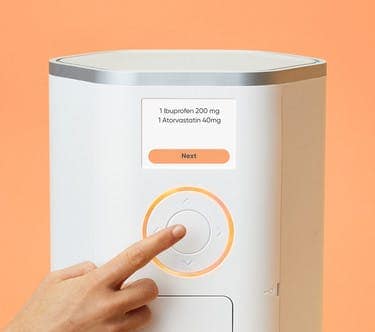
Hero is one of the newest automated medication dispensers on the market. It combines all of the features we love into an attractive unit that fits nicely on your countertop.
First off, it can hold up to ten different medications per day for up to a 90-day supply. It also comes with a companion smartphone app that makes it easy for caregivers to keep track of medication adherence. With this app, you’ll receive alerts any time your loved one misses a dose or, conversely, takes too many pills. Additionally, Hero will emit an audible alarm to alert you when it’s time to take your meds.
Another great feature of Hero is the ease with which you can fill it. Unlike other dispensers with clunky, time-consuming fill processes, the Hero streamlines this process through its intuitive sorting mechanism, which could potentially save you hours.
What’s more, Hero is one of the most affordable automated medication dispensers. Although you’ll have to rent the device, as opposed to owning it, you’ll only have to pay $99 upfront, followed by a monthly $29.99 subscription fee, which gives you access to the caregiver app.
For a more detailed look at Hero, take a look at our full review.
Pros
- Free shipping
- Flexible payment options
- 30-day risk-free trial period
- Holds a 90-day supply of up to 10 different meds
- Optional refill and delivery service with free shipping
- Smartphone app notifies caregivers of late and missed doses
- Reminders can be set for medications not stored in Hero
- Passcode can be added to protect medication from children
Cons
- User must press button to dispense meds
- Certain meds can't be stored in Hero like liquids, broken pills or powders
- Can't restrict users from dispensing meds - not appropriate for those who may be abusing medications or need meds restricted
- Not ideal for those with advanced cognitive impairments
2. Pria - Best Smart Features
What We Like Most:
- Smart Features
- Easy to Use
- Innovative Design
- Customizable Dispensing Regiments

Overview
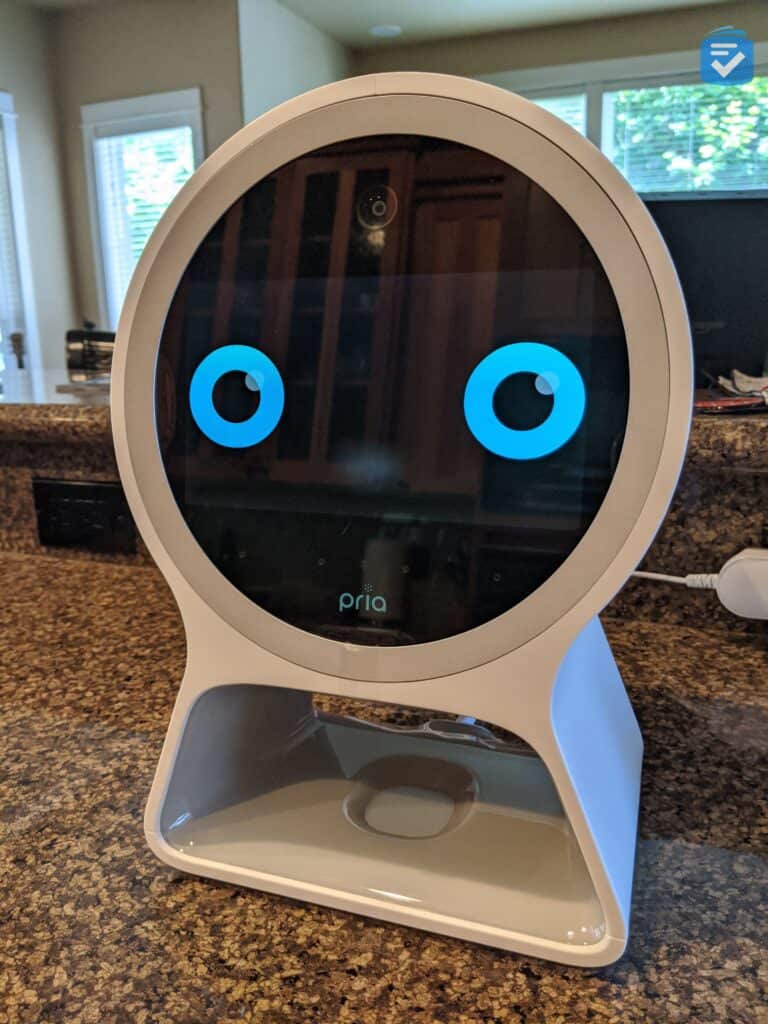
Manufactured by Black and Decker, the Pria automatic medication dispenser is a durable device that gives a facelift to automatic medication dispensers’ staid designs. With its compact size and adorable LED facial expressions, Pria has personality by the pound.
In terms of medication storage, Pria’s pill wheel has 28 separate compartments, meaning that it could potentially hold up to 28 days worth of meds. With that said, your loved one will likely take more than one batch of medication daily, so you’ll have to reload Pria more than other devices on this list.
What we love most about Pria, however, is its array of smart features. With your Pria subscription, you’ll receive access to the Pria app. With this tool, you can enter your medication schedule, in addition to other handy reminders such as doctor appointments or social events. Additionally, through this app, caregivers can track the user’s medication history, receiving notifications for missed or late doses. You can even make video calls using Pria’s camera and speaker.
In terms of cost, Pria is highly affordable, at an initial cost of $299. While this is higher than Hero’s activation fee, you’ll actually own Pria as opposed to renting it. This, combined with the Pria’s $9.99 subscription fee, makes it one of our favorite automatic medication dispensers.
If Pria sounds like the medication dispenser for you, then check out our Pria review.
3. MedaCube - Best Tamper Proof Device

What We Like Most:
- Tamper-Resistant
- Caregiver Alerts
- Holds up to 90 Days of Medication
- Flexible Payment Options
Overview
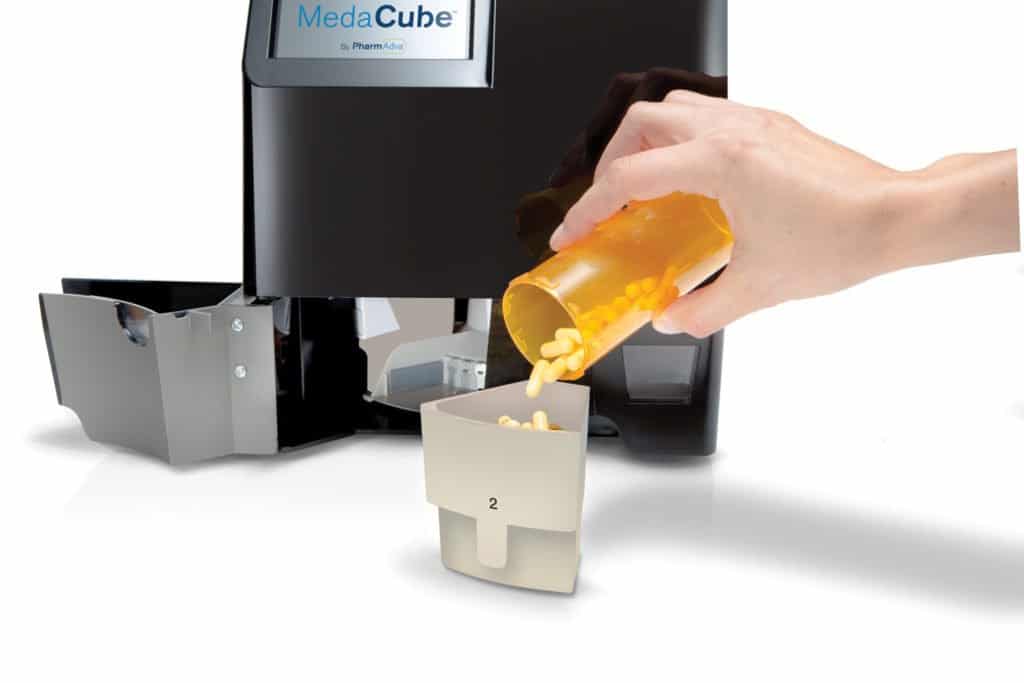
MedaCube is an automatic medication dispenser that can hold a staggering 90 days worth of medications, making it an ideal choice for those who’d like to avoid constant refilling. It’s also the only device on this list that has been clinically proven to improve a user’s medication adherence.
Each of MedaCube’s internal storage bins can store and dispense up to 16 pills at once, though this varies based on their respective sizes. Through its speaker, MedaCube alerts users when it’s time to take their scheduled medication. All the user has to do when they hear the alert is to touch the screen on the MedaCube, and a drawer pops out with their medication dose ready to take.
If a dose is missed, MedaCube will alert the user, in addition to notifying caregivers through a free web portal. Through this platform, users can also view a secure record of the dosing schedule and which ones were missed or late.
Costing $1,499, MedaCube is technically the most expensive device on this list; however, it’s also the only one that does not require any sort of recurring fee. This is excellent news for those who wish to avoid locking into contracts.
Check out our full MedaCube review to learn more about this system.
4. Lifeline Medication Dispenser - Best On-Demand Dispensing

Overview
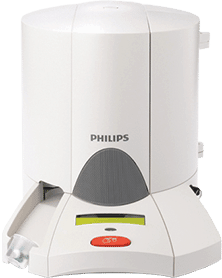
Philips Automated Dispensing Service is a subscription service with real-time monitoring options. It also features an internal rechargeable battery, ensuring that medications will remain properly dispensed, even in the case of a power outage.
Caregivers or nurses load medications into up to 60 cups. Depending on the amount of drugs, the system is good for up to 40 days of doses and can handle six different doses per day. The user hears an alarm when it is time to take a medication. They press a button, and the machine dispenses the appropriate pills.
Philips Automated Dispensing Service requires a phone line to work (it also works on VOIP) and will issue alerts to caregivers if doses are missed, if there is a dispenser error, or if medications need refilling. The system also offers a pre-program option for on-demand or PRN meds, so seniors can request as needed medications safely.
The Philips Automated Dispensing Service has no startup costs; rather, you simply subscribe for $59.95 per month.
5. Livi - Best Cellular Medication Dispenser

Overview
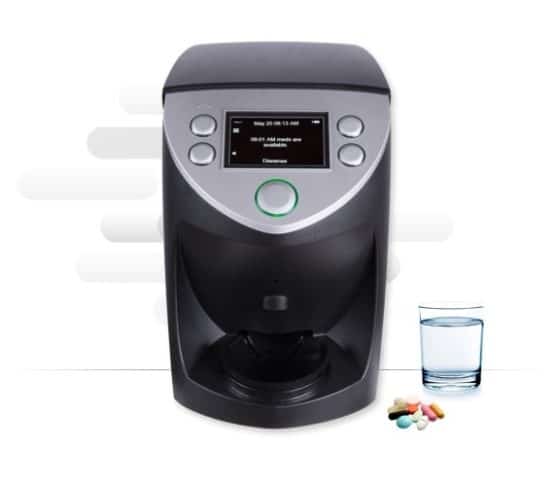
Livi is both a subscription service and pill dispenser, one that can handle up to 15 types of pills and dispense them up to 24 times per day. It stores up to 90 days worth of medication, depending on the dose and number of pills. We also like that it handles non-standard sized pills, whereas some systems can only support aspirin sized tablets.
Livi has an easy-pour system that lets caregivers pour each kind of pill into the machine without the need for hand sorting. The unit features a button for on-demand dispensing as well as regularly scheduled medications. It can even dispense up to 14 days worth of pills into travel packs for help with medication doses away from home.
With Livi, caregivers can access an online portal where they can manage dosing in addition to receiving alerts for device function and late or missed doses.
Depending on the amount of medication taken per day, Livi offers several different packages. The cost of Livi is $99 per month. This includes a pre-configured cellular data plan plus technical support. A $49 shipping and setup fee and the first-month rental fee is required upon checkout. Livi also does not require any long-term contracts, meaning the device can be returned at any time.
How We Judged the Automatic Medication Dispensers
When it came to evaluating each automatic pill dispenser, I had many options to review. Each device offers its own unique set of pros and cons, so, despite the number appended to each of them, the real question you should ask yourself is which dispenser is right for you. Still, there are some overarching qualities that I looked for.
Here is how I rated each device:
- Durability: Whether you rent or purchase your automatic pill dispenser, there’s no getting around the fact that these devices cost a pretty penny. With this in mind, I tested each of them for their ability to withstand falls and drops. All of the devices on this list can handle this likely wear and tear. What’s more, they’ll even hold onto your medications in the event of being tipped over.
- Reliability: The goal of a medication dispenser is to automatically give users predetermined medications at designated times. So naturally, with each of these devices, I tested them to ensure that pills were consistently given at the appropriate moment.
- Customization: You’d be hard-pressed to find two people with the same medical regiment, so the more in-depth a dispenser’s customization features, the better. While some devices allow for a greater breadth of options, every dispenser on this list demonstrated a high level of tailor-made medication plans.
- Tamper-Proofing: With some high-risk medications (such as painkillers), people can demonstrate med-seeking behaviors. To prevent this, several of these medication dispensers can be locked, thus preventing your loved one from accessing more pills than necessary.
- Caregiver Features: For many, a medication dispenser allows them to care for their loved one from a distance. Because of this, I looked for devices that included a variety of caregiving features such as video chatting and notifications of missed doses.
In Closing
Whether you need monitoring, independence in the home, or a simpler solution for medication dispensing, there should be a device on this list to suit you. Investing in an automated medication dispensing system means peace of mind for seniors and caregivers, mitigating the risk of medication mistakes and hospital visits as a result.
Automatic Medication Dispenser Frequently Asked Questions
-
How do automatic pill dispensers work?
Automatic pill dispensers work by storing doses of medication. These doses are preloaded by the user (or caregiver) and then dispensed at customized intervals. Some devices will also dispense doses on an on-demand basis through the click of a button. Some, however, will prevent this type of at-will dispensing, which is a good feature for those with higher risk medications such as painkillers.
-
Will Medicare pay for an automatic pill dispenser?
Unfortunately, Medicare does not pay for any sort of pill dispensing or reminding service, whether this is through phone call reminders or an actual device.
-
Can I still use my medication dispenser without paying a monthly fee?
Some of the devices on this list require no monthly subscription cost. These devices tend to have higher up-front costs. Monthly charges, however, tend to cover the cost of renting the device itself, in addition to giving you access to smart features such as caregiver apps and web portals.


